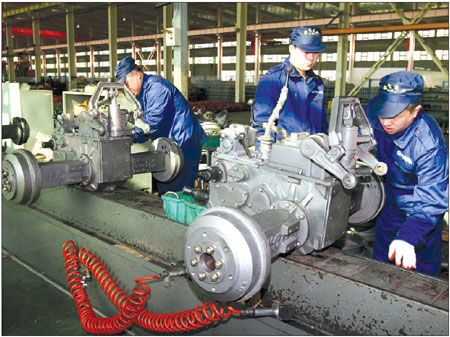Photos
Machine Made
Updated: 2011-04-08 11:08
By Lu Chang and Liu Mingtai (China Daily European Weekly)
Shortage of farmers, advances in technology boosting use of machinery
Cong Guangbo, 65, was a typical farmer in rural China who used to work long hours on his 1.2-hectare land, earning about 8,000 yuan (860 euros) a year. But from 2008, he stopped toiling on his land though his income grew substantially ?partly thanks to machines.
|
 Changchun Tractor Factory's products are in increasing demand in China. Provided to China Daily |
That year, the Chinese government began to allow rural households to transfer land-use rights, allowing small and scattered plots - like Cong's - to be pooled together for more efficient and intensive cultivation.
At the same time, increased subsidies were given out to buy farm machines to modernize agriculture.
The government undertook the moves to combat the growing trend of farmers' children turning their back on farming in droves, lured by hopes of an exciting city life.
Chi Renli, a professor of agricultural engineering in China Agricultural University in Beijing, says China is now at a critical transitional stage in its development from traditional labor-intensive farm production to one that's more reliant on machinery.
Over the past few years, the mechanization of China's agricultural production has reduced the annual need by about 10 million farm workers, estimates by the university show.
China's rural population is expected to shrink from 700 million now to 400 million over the next 30 years as farmers migrate to cities, according to a report by the State Council Development Research Center.
Cong takes advantage of the trend and subsidies and leases his land to a collective farming service center, run by his village in Chen Jiadian, in Nong'an county in Northeast China's Jilin province, for 12,000 yuan a year.
He then rents a corn harvester for 50,000 yuan a year, hires an operator and uses them to harvest corn for other farmers, charging them 1,000 yuan a hectare. Last year, he cleared about 100,000 yuan.
"This income is pretty good for me," says Cong, who had been working on the land for decades. His son and daughter - both married - left the farm years ago to work in the cities, leaving Cong and his wife as empty nesters.
"It is impossible for us to toil on the field at our age, and we were always slow to know what crops would be most profitable," Cong says.
His village bought 50 machines for large-scale production, after collecting 300 hectares of arable land leased from 200 households at the end of 2008. All the machines were rented to farmers such as Cong.
"It's a lot better to use machines since it's very efficient and effort-saving," Cong says.
"Before we would earn barely nothing, even after a year of hard work, but now we can make a very good profit."
Chen says the loss of rural farm labor forces many farmers to use farming machines.
"With more land joined together, large-scale production has become possible," he says. As a result, China is seeing a huge rise demand for farm equipment.
Zhang Taolin, vice-minister of agriculture, says that farm mechanization and the increasing use of machines is essential to boost agricultural production and increase domestic consumption in rural areas, and the government will continue subsidizing the purchase of agricultural machinery.
The Chinese government's subsidies for farm machinery purchase have grown dramatically; in 2007 it was 2 billion yuan and it reached 15.5 billion yuan from January to October in 2010, statistics from the Ministry of Agriculture showed.
Imports of farm equipment from countries such as the United States, Japan, Germany, Italy and France amounted to $2.07 billion in 2010, an increase of 32.73 percent year-on-year.
This has led many foreign agricultural machinery companies such as John Deere, Agco, Kuhn and CLAAS to make ambitious plans to expand their presence in the world's fastest-growing market, competing with domestic firms.
John Deere's David Everitt said his company wants to grow "our domestic and export market in China".
"We have many investment projects around the world but China has always been our focus since China is the fastest-growing market we have," Everitt, president of the company's agricultural and turf division, told China Farm Machinery magazine.
John Deere's business in China has been growing by 20-25 percent a year over the past few years, and Everitt says the company plans to double its size around the world by 2018.
The Illinois-based company has been in China since 1976 and has been manufacturing in China since 1997 when it formed a joint venture to build combines in Jiamusi, Heilongjiang province in Northeast China.
The Jiamusi operation is now wholly owned. The company also makes tractors at a joint venture, John Deere Tiantuo Co Ltd in North China's Tianjin.
In 2007, John Deere acquired Benye Tractor and Automobile Manufacture Company, in Ningbo in East China's Zhejiang province, which built tractors in the 20-50 horsepower range.
Before the acquisition, John Deere built tractors in the 60-120 horsepower range, but the acquisition has given it a wider product line, with the growing demand for smaller tractors in China, brought on by increasing mechanization of rice farmers.
Zhang Li, general manager of the Asian office of the German Agricultural Society, says many German farm equipment companies are looking at establishing factories in China to reduce the costs.
China is important to German companies from two aspects, Zhang says, as it is an emerging market with an incredible growth rate and one with a very cost-effective manufacturing base to support other markets in the world.
Xu Yuanlun, the chief representative of CLAAS, a German farm machine manufacturing company, says that although the company has yet to establish any joint venture in China, it is considering setting up a production base.
"It's an important decision because we want to make the products customized to local needs, and to price our products reasonably," Xu says.
CLAAS has been exporting tractors and harvesters to the Chinese market for seven years. "Our main task is to develop our dealer distribution channel and at the same time to seek opportunities to work with local companies for assembling and production," he says.
China's agricultural machinery sector had been through a period of recovery since its low point in 2004 and has maintained a growth rate of more than 20 percent for six years running. The gross output of the industry totaled 283.81 billion yuan in 2010.
E-paper

Green light
F1 sponsors expect lucrative returns from Shanghai pit stop
Buying into the romance
Born to fly
Light of hope
Specials

Share your China stories!
Foreign readers are invited to share your China stories.

Have you any wool?
The new stars of Chinese animation are edging out old childhood icons like Mickey Mouse and Hello Kitty.

Fill dad's shoes
Daughter and son are beginning to take over the family business of making shoes.
